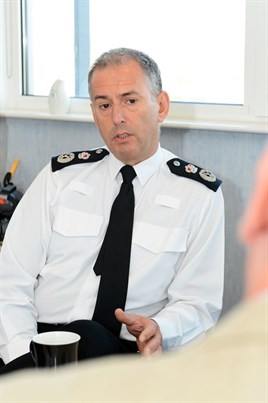Complaints
In the past year there has been a rise both in the number of complaints made against BTP and in the proportion of those complaints upheld following investigation.
Some 448 formal complaints were made by members of the public - 100 more than the previous year. The majority were dismissed or resolved locally, but 85 complaints were upheld and the police found to be in the wrong.
Crowther thinks that is mainly because the public have been encouraged to come forward to complain, and because the process of making a complaint has been made easier.
Among the many positive performance indicators, time lost as a result of cable theft is down by three-quarters compared with six years ago - a real achievement.
But staff sickness has remained stubbornly high. A BTP officer takes, on average, more than seven days off sick each year.
“I think it’s still awfully high,” admits Crowther. “If you compare us with industry, we are pretty favourable. But remember ours is a contact sport. Our people are stepping into situations that others are moving away from. Some sickness is caused by injuries, assaults and so on. My staff will tell you we are very tough on sickness.”
Delays
After a substantial reduction in the time lost on the railway due to crime in 2012-13, the trend reversed last year. The number of lost minutes increased by 6%. For the industry, that represents millions of pounds of additional cost.
“Primary delays” are calculated as the minutes lost by a train due to an incident directly affecting that train. The increase last year was 4%. “Reactionary delays” are based on the number of minutes that other trains are delayed as a result of the original incident. That rose by 8%. The delays due to trespass and vandalism were up by 12%.
“This is something we are determined to do more about,” says Crowther. “First and foremost, we protect the public. But we give ourselves KPIs for reducing disruption. Other police forces would think this is mad, because what we do is inevitably disruptive. We have been very ambitious in saying that we will contribute to reducing overall disruption.
“The latest figures are slightly more encouraging - in the year to date, primary delay is now just down by half of 1%. So we are bearing down on the stuff we can directly influence.
“What we can’t influence is some of the reactionary delay. If it takes time to get a relief driver along after an incident, we cannot do much about it. But we now have some interesting hot spot analysis that tells us where disruption is happening. We split that into high frequency but low-impact locations, which tend to be down to trespassing, where the delay impact may not be large. And low frequency but massive-impact locations. That is where we have been directing our patrols and prevention activity.
“Tackling this is within our collective gift. If we identify a high-impact location, we ought to put a moat full of crocodiles around it, so no one gets near. The game-changer is direct action by the industry once we have identified that spot, putting engineering and management solutions into that location.”
Terrorism
A recent study by the House of Commons Transport Select Committee praised the BTP’s proven approach to terrorism, honed over several decades.
Crowther knows the arguments well. He was the area commander on the day of the July 7 bombings in 2005, a series of co-ordinated suicide attacks. Have the processes evolved to deal with the latest heightened state of security alert, following events in Syria and Iraq?
“We all hold a big responsibility to make it as difficult as possible for those outrages to take place, notwithstanding that this is an open network. All of our people all the time have a brief that they are trying to spot attack planning. They are looking for suspicious activity, looking to disrupt anyone carrying out reconnaissance. We obviously have some specialist resources, too.












